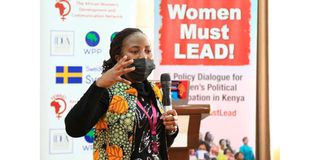How female political aspirants are wooing voters

Femnet Women leadership Project Coordinator Dorothy Otieno. She says their organisation not only prepares women to join politics, but also empowers them to challenge the status quo and influence reforms in the political sphere.
What you need to know:
- Female aspirants seeking elective seats in the 2022 General Election have adopted varying strategies to woo voters.
- Some have created a network of women and youth supporters campaigning for them in their respective wards.
- Democracy Trust Fund, established by Echo Network Africa enables women to save money to run.
Female aspirants seeking elective seats in the 2022 General Election have adopted varying strategies to woo voters.
Esnahs Nyaramba, an aspirant for Kisii Woman County Representative has found mobilising youth to register for national identity cards, a beneficial means of selling her agenda.
“I educate them on the importance of voting while I share with them my development plan. It becomes easier for them to campaign for me among their parents and peers since I have connected with them,” she says.
For more than a decade, she has worked with the community towards ending female genital mutilation (FGM), the work which she says has raised her visibility in the villages.
Campaign financing
“The fact I have worked with the community for so long works in my favour…the less you are known, the more money you use to make yourself known to the people,” she says in response to her campaign financing plan.
As a director of Young Women Democrats, Ms Nyaramba says she has created a network of women and youth supporters campaigning for her in their respective wards.
“I know I am destined for a win. I’ll continue to fight against FGM, find opportunities for women to become economically empowered, especially through adding value to bananas and avocados,” says Ms Nyaramba, a member of Amani National Congress.
For Mukami Nthiga who aspires to be Embu County Woman Representative, she capitalises on crowd pulling events such as church events, women and youth meetings. She says this strategy is more effective with less financial resources.
Successful business
“I have my people on the ground in all the wards who inform me of the upcoming events,” says Ms Nthiga, who has an experience in political communication having worked with politicians for seven years.
Ms Nthiga who has been mentored by Narc Kenya party leader Martha Karua, says she offers to enable women and youth run successful businesses, lead fights against FGM and promote the education of the girl-child.
Some initiatives have been launched by women rights organisations to support female aspirants such as Ms Nyaramba and Ms Nthiga successfully vie.
Democracy Trust Fund (DTF), established by Echo Network Africa (ENA), for instance enables women to save to run.
“Women need to start saving early because they know how much money they would need to campaign,” says ENA group chief executive officer Dr Jennifer Riria.
“DTF makes sure these money is properly invested to attract higher returns. Thereafter, women can get the principal amount and the interest when they are ready to run,” she explains.
Training manual
“What we emphasise is their own sincerity to their own dream. Don’t save with us if you are not intending to run,” she adds.
Every last Thursday of the month, they hold a virtual meeting with the 100 women saving with DTF to discuss issues relating to their preparedness for election.
Dr Riria says together with the Ministry of Gender, they developed a training manual for coaching aspirants on running to win. The manual covers among other issues election violence, campaign financing, election fraud activities and access to media.
African Women's Development and Communication Network also runs a women’s leadership project.
Dorothy Otieno, the project coordinator, says they not only prepare women to join politics but also empower them to challenge the status quo and influence reforms in the political sphere.
“We bring the women together to dialogue on barriers standing in their way. This has been helpful because women get to learn from each other on how to manoeuvre through the challenges,” she says.
Virtual academies
They also hold forums with female parliamentarians to share experiences on how to be efficient and effective leaders while in power.
Last October, Forum for African Women Educationalists (FAWE) and Oxfam signed a memorandum of understanding to host third and fourth women in political participation virtual academies, run to create synergy and cooperation amongst women political leaders in Kenya.
According to FAWE executive director, Martha Muhwezi, the academies were to also “demystify perceptions held by women from getting into political leadership roles thus enhancing women politicians’ visibility.”
The previous virtual academies had been held in partnership with the International Institute for Democracy and Electoral Assistance.





